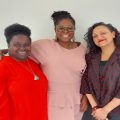
The room was packed with black, female social workers, practice educators and lecturers listening and conversing openly, unfiltered.
Within the safety of each other’s company, they spoke of missed promotions, enduring racist remarks from professionals, feeling alienated, their traumas and the barriers they met when creating black female-only spaces.
The occasion was the one-year anniversary of the anti-racist movement (ARM) for social workers, a black female-only group.
According to its founder, Shantel Thomas, the idea had come out of a necessity for a space for black women to offload without white colleagues casting doubt on their experiences.
“Social work is a female-dominated profession and what you find is, yes, men may be in the minority, but they climb a lot easier,” says Thomas, a social work academic who was formerly anti-racist lead at the British Association for Social Workers.
“Women, especially black women, tend to hold on to their trauma internally and there wasn’t a safe space to express that without having to explain and apologise or try to compensate.”
A reflective anti-racist model

Photo by ARM
In a unique approach, the group employs social work techniques to “create an emotionally-informed thinking space” and help its members cope with traumatic experiences caused by racism.
This involves using a reflective case discussion model of group supervision developed by social work professor Gillian Ruch, which resists problem-solving and steers practitioners away from “blaming or pathologising” and “feeling individually responsible for an outcome”.
In each session, practitioners are invited to take 10 minutes to describe their dilemma. They then sit silently as other members discuss and share their theories and perspectives before coming back and reflecting on what resonated.
“Naturally, as social workers, we get straight to what we need to do instead of stopping and thinking why this may be happening. [Through this process,] we’re trying to encourage thinking before taking action,” explains Thomas.
What the sessions particularly focus on is black female practitioners’ wellbeing and self-confidence, which is often eroded by microaggressions and racist incidents in the workplace.
By providing different perspectives of other black women, the group offers members a space to process their often confusing and painful experiences, says Thomas. This enables them to take more strategic steps to alleviate them.
“What happens with black women is we experience a microaggression or a direct, overt type of racism and we start to second-guess our consciousness. We overthink about what that could be and it’s so painful that it affects us internally. When we discuss it, she’s able to get validation, unpick it from different viewpoints and understand that it’s not about her, it is about other systems or structures.”
Missed promotions
A common theme among members has been lost promotions with vague feedback, with roles given instead to less experienced white colleagues, says Thomas.
One black social work lecturer had worked in her role for around 20 years, including supporting big projects and an international recruitment campaign. But when she put herself forward for a promotion, a white colleague she had mentored got it instead.
The rejection and vague feedback that followed left the lecturer doubting her worth as a professional and so she turned to the group for advice.
Having raised issues with the same organisation several times, she was connected with a key member for one-on-one mentoring.
“She was doubting herself and her abilities,” Thomas says. “She had achieved so much but that one thing about not getting the job counteracted all that. And sometimes, it doesn’t matter how much unpicking you do, there are no solutions. That’s what the additional conversation was about. It was ‘you need to get out of there because it doesn’t feel like things are going to change’.”
With ARM’s support, the lecturer not only quit but applied for a more senior role with a different employer and was appointed.
The need for black female-to-female mentorship
Mentorship is key in ARM, which highlights the benefits of having experienced black female social workers supporting other black female practitioners.
For social work professor Dr Carlene Firmin, her most vocal years were at the start of her career, when she had been nurtured by black women in her workplace.
“If I think back to myself at the start, I was bold. I was going into a room confident, very clear about what I thought. Then that was quiet for about 15 years,” she says.
“At the start, there were black women around me, leaders that nurtured that fire inside me. And that’s something a movement like this can offer to people starting out.”
According to Thomas, no black woman, or man, can be prepared for the harsh reality of being a black social worker. That’s where the need for a black mentor lies.
‘We need a space to talk about the trauma’
The first time she realised she could have needed a black mentor was as early as her first year as a qualified social worker. During a visit, a mother became vocal about her distaste towards having a black woman commenting on her parenting.
“She was direct about it. I remember sitting there frozen because I didn’t know what to do,” says Thomas. “I grew up nestled in my Caribbean bubble and I hadn’t been exposed so brutally to [the reality of the world]. So it was like somebody punched me in the stomach. It made me realise how others see me, not for anything that I’ve done, but for the colour of my skin.”
When she returned to the office, she did not seek her manager or a colleague for support. Instead, she went to the bathroom, cried, and went back to work quietly, never speaking to anyone about it.
“My manager was an Asian lady but I didn’t know what to say. I remember it so vividly. Even speaking about it now, I can feel how I felt at the time. That would have been a perfect time to have a mentor,” she adds.
“There are many experiences that I purposely haven’t thought about for my own survival. But that’s where mentoring, coaching and therapy come in. We need a space to talk about all the traumas that we experience.”
To join one of ARM’s sessions you can contact Shantel Thomas via Twitter or LinkedIn.





 Family help: one local authority’s experience of the model
Family help: one local authority’s experience of the model  ‘I spent the first three months listening’: how supportive leadership can transform children’s services
‘I spent the first three months listening’: how supportive leadership can transform children’s services  How senior leaders in one authority maintain a culture of excellence
How senior leaders in one authority maintain a culture of excellence  How staff support ensures fantastic outcomes for children and families
How staff support ensures fantastic outcomes for children and families  Workforce Insights – showcasing a selection of the sector’s top recruiters
Workforce Insights – showcasing a selection of the sector’s top recruiters 

 Facebook
Facebook X
X LinkedIn
LinkedIn Instagram
Instagram
Dear Shantel, I found your article informative and helpful. The examples you have described I can say I have experienced all.As a social worker, I would find this support helpful. I have felt the same emotions described by your article. What is hurtful is that you want to carry out your role to the best of your ability and do not understand why the color of your skin continues to prevent you from progressing.
Those children who come into contact with the service also experiencing the same feelings.
What helped me was believing in my own self-worth and my abilities, you come to learn that this will be eroded evenly if you do not stay strong.
Why are most of the leaders, CEO’s, directors & senior managers in local authorities white? No wonder they are institutionally racist!
“Why are most of the leaders, CEOs, directors & senior managers in local authorities white?” It’s the reality of the demographic profile of Britain.